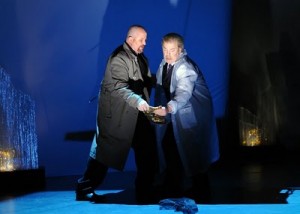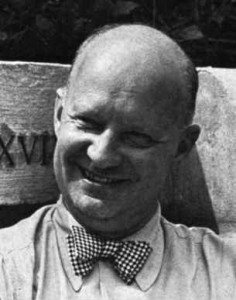Classical Music Review: A Killer “Cardillac”
Many musicians know Paul Hindemith (1895–1963) as a somewhat dry composer who wrote a few operas as well as sonatas for every instrument and some half dozen for viola (he played both violin and viola extremely well). But real Hindemith has a cutting lyrical gift, much of it is on display in his kinky opera Cardillac.

The Officer (Steven Sanders, l.) confronts Cardillac (Sanford Sylvan, r.) in a tense moment. Photo from the dress rehearsal of CARDILLAC by Clive Grainger © 2011 Clive Grainger/ Opera Boston
Cardillac. Music by Paul Hindemith. Libretto by Ferdinand Lion. Staged by Opera Boston at the Cutler Majestic Theater, Boston, MA, through March 1.
By Susan Miron.
Opera Boston’s new production of Cardillac gets just about everything right, starting with their choice of opera. While somewhat popular in Europe, Hindemith’s Cardillac has had a hard time catching on in the States—Opera Boston’s current production is the first of this opera since 1967. Written in the early 1930s, Cardillac underwent revisions 25 years later, adding an act, but the original version is the one that caught on and which Opera Boston is doing.
Bookending the opera were two sessions conducted by the irrepressible, former Boston Globe music critic Richard Dyer. The pre-opera session involved two acclaimed local composers who had been Hindemith’s students together at Yale—Martin Boykan and Yehudi Wyner. Wyner remembers his “blazing, volcanic intelligence.” The two composers remember him as “a wild man,” whose second opera did not please Hitler. Knowing he was on Hitler’s hit list, he soon decamped and settled in at Yale.
Many musicians know Hindemith as a somewhat dry composer who wrote a few operas as well as sonatas for every instrument and some half dozen for viola (he played both violin and viola extremely well). But Boykan sees the real Hindemith as having a lyrical gift, much of it is on display in Cardillac. Mr. Dyer referred to Hindemith’s “protean musical personality,” while the other two men recalled their teacher as “short, rotund, and bald . . . jovial and energetic. . . he looked a bit like a sausage.” What emerged from their descriptions was a composer who had a tendency to follow the rules rather than doing what he wanted, who “felt morally obliged to return to the rules of writing music.”
Opera Boston’s production came about after conductor Gil Rose—here for the first time since winning the job of Artistic Director in December 2010—asked baritone Sanford Sylvan which opera he’d most like to do. Cardillac may not be the dream of every baritone, but Sanford Sylvan, now living in Montreal and teaching at McGill University, is still at the top of his game and can do and sing whatever he now pleases. Sylvan is one of those singers (I have raved about him elsewhere. He is a miraculously good singer/actor) who slips into his role so seamlessly it’s almost creepy. Here he played the title role, entering with a strange, grayish wig and dark glasses, looking like a Mafioso who got lost in an opera about himself.
With a libretto by Ferdinand Lion, based on Das Fräulein von Scuderi, a novella by E. T. A. Hoffman, Cardillac (pronounced Cardi-yak) is all about lust/acquisition, obsessions, psychological pathology—a story about an artist who loves his artwork so much that he feels compelled to kill anyone who buys a piece of it. It begins without a back story but with a giant, flat-screen TV showing pictures of Cardillac’s magnificent jewelry, “which rivals the Florentine masters,” during his annual jewelry exhibit. Dressed as ruffians and women with fabulously expensive stockings, seriously high heels, and very short skirts, the crowd is yelling “Murder.” The crowd, checking out the jewelry, has discovered a corpse. They fear it is yet another victim, someone who, once again, had bought a piece of Cardillac’s jewelry.
The scene throughout the three uninterrupted acts is his workplace/store, with three large, gray walls at odd angles with shadow play behind them, like a dancing Greek chorus. Much is pared down in these set pieces—Cardillac has only this one name, while all the other characters (all sung well) remain named for their function: Gold-Merchant (the always worth-hearing David Kravitz), Cardillac’s daughter (the wonderful singer Sol Kim Bentley), The Officer (Steven Sanders), Lady (Janna Baty), The Cavalier (Frank Kelly). The cast was uniformly excellent, as was the orchestra, which featured Boston’s well-known saxophonist Ken Radnofsky playing melodies associated with the pathological Cardillac.
Among the memorable scenes is the erotically charged, sadomasochistic “love” scene between Lady (Janna Baty in an elaborate, black corset, garter belt and black stockings) and The Cavalier. This was his reward for buying her a piece of Cardillac’s work—knowing certain death lay ahead and thus being allowed to have an erotic evening with her. Two flutes have an elaborate duet, accompanying the purchase and the explicit sex, conducted with the knowledge that Eros will mean Thanatos.
The two women, The Lady and Cardillac’s devoted Daughter, all but hijacked the opera with their exquisite voices and incisive acting. Sanford Sylvan’s quiet, complex performance adds another brilliant characterization to his list of roles he owns: Chou En-Lai from the world premiere of John Adams’s Nixon in China, Figaro in Le Nozze di Figaro, and Klinghoffer in John Adams’s The Death of Klinghoffer. He feels that what he creates belongs to him, that people are buying it for the wrong reasons—they lack the proper respect for it. Like the lead character in Puccini’s Turandot, Cardillac takes his time on stage before singing a word. But he and his demonic, murderous self capture your attention even when he’s quiet.
The opera ends with Cardillac confessing, finally, he is the murderer. The crowd descends upon him, “a sacrificial victim of sacred madness,” the text explains. Opera Boston’s decision not to take a break (much-needed for the brass and winds) for its hour and a half duration helped emphasize musically the inevitability and speed of Cardillac’s demise.
In his program notes, Dyer writes that of the nine operas, “none without interest,” that Hindemith wrote, two masterpieces tower above the others—Mathis der Maler, his greatest work, and Cardillac. Kudos to Opera Boston for assembling such an excellent cast, headed by the incomparable Sylvan. It was beautifully played, conducted, and directed.



Maybe I went on a bad night, but this review is incomprehensible.
I usually leave Opera Boston’s performances wishing they’d rehearsed a little more, but this time I left knowing that no amount of rehearsal could have made those voices fit together. I wanted to blame the director, who is at fault for not talking to the cast into working on the same presentation of the music. I ultimately decided it’s that there was a lack of available talent on this one. Perhaps that had to do with the droning music most people find unpalatable until the very end piece, which greedily stores all the beauty of the work.
The staging was great, though, with few technical gaffs.